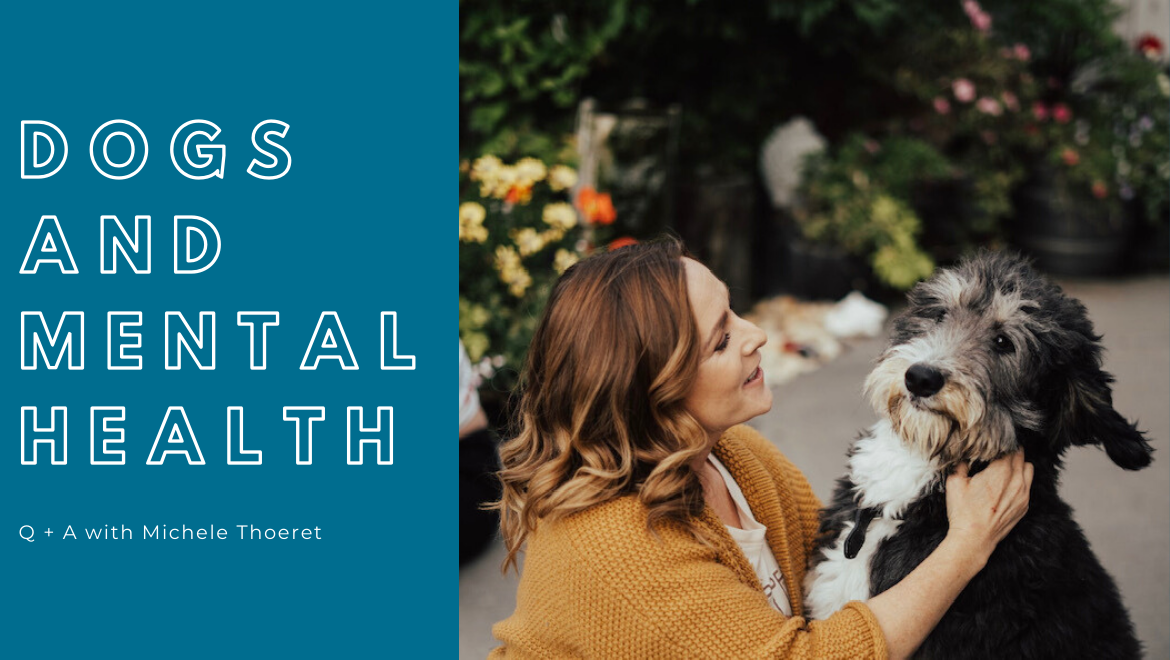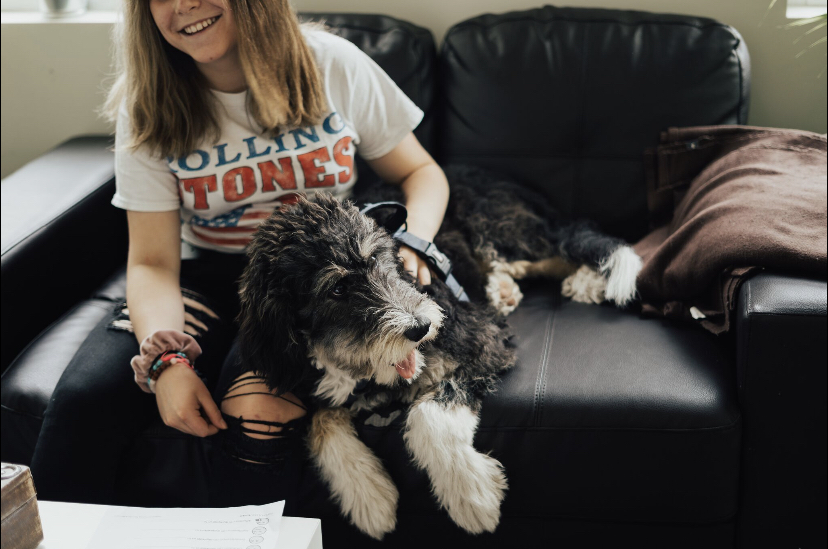Dogs and Mental Health

Have you had one of those long days at work that leave you feeling tired, stressed, angry, unhappy, unseen, or even defeated? The first thing you see once you get home is your dog, who is elated that their person is home. You know, the excited tail wag, the “I’m so excited to see you” noises and excessive ‘please pet me’ demand for love. In an instant, your stress melts away, and you feel that little jolt of love warming your insides. Even if your dog doesn’t greet you with this much exuberance, you know full well the effect our canine friends have on our well being. Maybe that’s the whole reason you GOT a dog in the first place.
What is that thing? Why does petting a dog calm us down? How can caring for a pet be good for stress and anxiety? Can a dog truly help with loneliness, fear, and depression? Is my dog teaching me mindfulness and helping me cultivate compassion in other areas of my life? What about old traumas from past experiences, how can a puppy pooping all over the house, chewing up everything in sight, who barks at loud noises assist in healing?
We recently asked Michele Thoeret to help us dive into the connection between Dogs and our Mental Health.
Michele is the creator of EmpoweredU here (in Edmonton): Yoga, Mindfulness, and Lifestyle. She’s an author, educator, therapist, and mom of 3, who is obsessed with all things stress and how people can shift from just surviving to thriving. The newest member of her family is a big, beautiful Bernadoodle therapy dog named Khione.

Michele has been studying yoga, wellness, and psychology for over 20 years. She has accomplished many things from working with corporations on wellness programs for better stress management, leading yoga and mindfulness teacher trainings, facilitating mindfulness and self-development retreats, and working as a therapist. Michele’s skills lie in being able to create safe trauma-informed spaces, meet people where they are at, and inspire curiosity about what else is possible.
DJ: ‘Let’s talk about stress, what is truly happening in the body and the mind?’
Michele: ‘Stress was originally called general adaptation syndrome when it was discovered that lab rats were exhibiting a specific response unrelated to the medications being administered. What the term GAS refers to is that living systems like to be at homeostasis (which is a fancy word for balance) and as a result of a stimulus often move out of balance and then need to adapt to get back. To the extent that we can mobilize resources and meet these demands, we adapt successfully and become stronger. When the demands or pressure on the system is too great we become overwhelmed and this is where depletion and exhaustion come in. Stress was a term that was later coined that more specifically relates to how we generally respond to the demands and pressures we experience in our lives. The interesting thing in humans, however, is that we can respond to both real and imagined pressures or threats, meaning that just thinking about danger, rejection, to-do lists, and getting it all done. The stress response is typically referring to our built-in protection orchestrated by the autonomic nervous system. In this system, we have a gas pedal and a brake. The gas pedal is the sympathetic; fight and flight and the brake is the parasympathetic; rest and digest. The minute we detect any danger this system responds accordingly and can flood us with a chemical cocktail that prepares us to fight off a tiger or run for our lives. You might feel this as a dry mouth, racing heart, rapid breathing, knots in the stomach, and tension in the body. So this response is what keeps us alive in life or death situations, or might motivate us to go that extra mile, however revving the engine without ever slowing down or taking a rest can have catastrophic effects on our brain and bodies. We know that stress hormones make the brain more hypervigilant and more primed for negative experiences (as this is what will keep us alive). Over time these changes to the brain can lead to anxiety, depression, difficulty focusing, and other ’stress injuries’ and mental illness. The stress hormones also stop digestion, destroy our gut microbiota, increase blood sugar, stifle our libido and fertility, decrease our immune function, increase tension, and more.’
DJ: In your opinion: How can dogs help us stay present and “In the moment”?
Michele: Generally speaking a lot of our daily stress comes as a result of worry, rumination, and constantly comparing what is happening right now with what ’should’ be happening or what we expect to happen. Dogs can help provide a healthy distraction in that they can divert our attention away from the whirlwind of expectations, judgments, resentments, and worries that we can get hooked into in our minds, and re-direct our attention to the here and now. There is something about my dog that constantly reminds me to just be here and not be so invested in or consumed by all the other noise in my mind or from the media.
DJ: What is a therapy dog? And how do you incorporate Khione into sessions with your clients
Michele: There are many types of therapy dogs from emotional support to dogs that provide additional assistance. Khione is sometimes present in my client sessions to help ground myself and clients and in addition, she provides some emotional support when moving through difficult emotions. Many of our traumas are relational in nature, and the non-judgmental acceptance that Khione offers I believe helps with regulation through connection and soothing.
DJ: Everyone has been affected by the current Covid-19 pandemic, can you give us all a few tips/tricks we can all do at home to help manage anxiety and stress
Michele: Whatever you are feeling, whether others think you are overreacting, under-reacting, or anything else, whatever you are feeling is valid. Remember this situation is new and unprecedented and evolving rapidly. It’s normal to feel angry, afraid, hopeless, worried, confused, optimistic, depressed, alone, empowered…etc. We are all navigating these uncharted territories together.
By design, humans are incredibly adaptive and one of our primary operating systems is on survival. In times of uncertainty and danger, we become hypervigilant and hyper-focused on dangers and often filter out everything else. While this increases survival in some situations, it can also lead to excessive worry, anxiety, panic, and overwhelm. Trust that your survival instincts are doing everything they can to keep you safe and you are supported, so that in those opportunities when it’s okay to feel safe, calm, and relaxed you can, in fact, feel safe, calm, and supported. If you have a dog curl up with it if not deliberately find opportunities to relax and unwind.
In times of chronic stress, global uncertainty, and rapid change the brain’s negativity bias gets even stronger allowing us to focus on information that is important for survival like perceived dangers and risks while filtering out positives such as contentment, beauty, compassion, peace, comfort, and relaxation. Deliberately “taking the good” allows us to hardwire our brains and nervous system to be more primed for positive experiences. Dr. Rick Hansen offers the acronym HEAL for practicing pleasure. I like to do it at the dog park when I am out in nature.
HAVE: Notice when you are having a positive experience, whether it’s a warm cup of tea, a beautiful sunset, or petting your pet.
ENRICH: Exaggerate this experience by really paying attention to all the pleasurable feelings associated with it
ABSORB: Imagine these pleasurable feelings as a colour or symbol or light being absorbed into every cell in your being.
LINK: While you are having this experience, you can also link into the background that other not so pleasant or stressful experiences.
One of the effects of our stress response is the mobilization of resources to meet demands. This can often lead us tense (our muscles tense up to prepare for fight or flight) and exhausted. Taking time every day to gently stretch and relax (if exhausted) or move (mobilize if energized) helps us reset our bodies and minds back to neutral. Try some daily movement, yoga, stretching, or guided relaxation to help release stress and unravel holding patterns stuck in the body
While sometimes it’s helpful to be with all of our emotions, thoughts, and sensations, other times when there is so much going on, or if we need to focus on a specific task, practices for containment, grounding, shifting, and distraction are also helpful. I refer to these techniques as conscious opening and conscious closing because like turning a tap on and off we can have some control over what we process and when. Healthy distraction techniques might include, taking a walk, dancing, listening to your favorite music, making a puzzle, colouring, or any other activity that is enjoyable or requires your full attention
When you do have the time, space, and energy to go inwards and feel through whatever is there, mindfulness practices may help us stay grounded while being with whatever is arising in more of a calm and non-judgmental way.
Michele’s vision as an author, educator, and mental health therapist is to empower individuals to become more engaged in their moment-to-moment experiences, transforming the way they show up in their bodies and lives every day. Inspired through years of studying the human body, movement, yoga, mindfulness, natural medicine, and psychology, Michele encourages a compassionate curiosity about who we are, why we are, and what else might be possible.

Michele utilizes a variety of therapeutic modalities including mindfulness, yoga, somatic stress relief, compassion-focused therapy, EMDR therapy, dialectical behavioral therapy (DBT), Gottman couples therapy, and narrative techniques to support individuals in being more connected, current, and creative in their relationship with themselves and their environments. Visit https://empoweredu.ca for more information on courses, trainings, and workshops.
